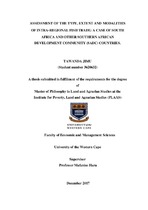Assessment of the type, extent and modalities of intra-regional fish trade: A case of South Africa and other Southern African Development Community (SADC) countries
Abstract
This study assessed the type, extent and modalities of intra-regional fish trade
between South Africa and other SADC countries. Cross-border fish trade and its
importance in boosting intra-regional fish trade between South Africa and the rest
of SADC is poorly documented and as such, little systematic effort has been made
to understand its type, extent and modalities in order to address the problems of
those engaged in the activity. Regional fish trade continues to be important even
though it is not always adequately reflected in official statistics.
The qualitative research methodology formed the basis of this study. Data was
collected through semi-structured interviews with fish traders at Park City Central
Bus Station in Johannesburg and in-depth interviews with selected key informants
from customs, port, health and immigration officials at the Beitbridge and
Lebombo border posts. Participants of the study were selected through a
combination of purposive and snowball sampling techniques. Geographical
Information System (GIS) was used to digitise national boundaries, border posts
and the routes used by fish traders from the sources to distribution points in
Johannesburg. The study adopted the new regionalism, regional integration and
regional trade conceptual frameworks and attempted to apply the pro-fish trade
theory as the theoretical framework.

